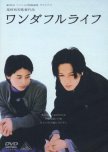Stop and consider for one moment: what is your most precious memory? Would it sustain you if all the others were completely washed away? Might it be enough even if you could never form another? In the haunting and emotional After Life (originally Wandafuru Life or “Wonderful Life,”) heaven and hell do not exist. There is but one choice. After dying, you must select one memory to “live” inside for all eternity—with nothing but the thoughts and feelings of that moment for just as long. Everything not contained in that memory returns to dust.
And so viewers join a group of counselors, long dead, as they work with the newly deceased to find their best memory. Each counselor is charged with several individuals, and they interview them one by one in order to root out what will make them most happy. As such, much of the film takes place in documentary-style interviews. We hear various stories from many individuals, diverse in ways from content to age range and era. However, there are a few unable to pin down anything anything at all. One man has never truly had a happy moment in his life, while another refuses to select anything despite ample material. Another young lady realizes times she thought were special were not quite as she remembered. What will happen to unfortunate people like these? There is also a mystery surrounding the counselors themselves… who are they and why were they chosen for this work?
Yet with such intense subject matter, After Life manages to be gentle and slyly humorous. It never reaches into your chest to tear out your heart, but delicately stirs that part of you which values sentimentality and fears death. What makes this film excellent is how carefully it explores these subjects: mortality and memory. It may induce laughter in you, perhaps it will leave a lump behind in your throat; but above all else, After Life will make you think long and hard. What would you choose?
Many familiar and veteran names grace the cast listing, such as Iura Arata, Terajima Susumu, and Iseya Yusuke. They stand out here as well, particularly the two counselors. However, the real stars are the memories and the people who share them. Many of the “interviews” were completely impromptu, and the people depicted are not actors, but real people reminiscing on film. Though it isn't clear which are scripted and which are authentic, they all leave great impact.
I always claim music is of paramount importance in both film and television. Despite this preference, it seems I've found an exception in After Life. This is a movie that does just fine without much of a soundtrack to recommend it. In fact, the silence lends realism, a solemn kind of respect and authenticity. There are no emotional cues for the audience, either…which is surprisingly nice for a change.
Vond je deze recentie nuttig?























